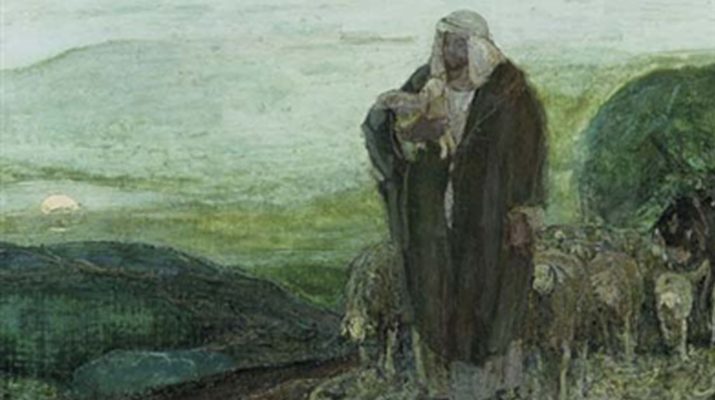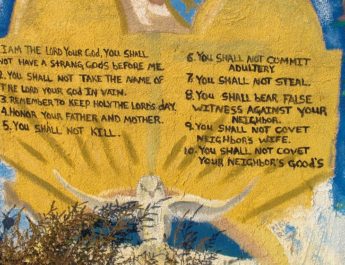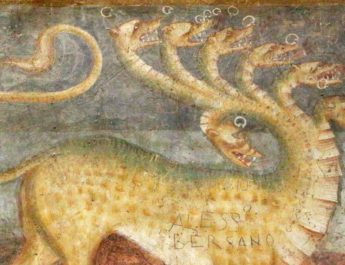John 10:22-30
Eastertide C24
22 At that time the festival of the DedicationA took placeB in Jerusalem.C It wasD winter,E
A “festival of the Dedication” = egkainia. 1x in NT. From en (in, at, by, with, among) + kainos (not new as in new versus old; new in the sense of novel, innovative, or fresh). This is dedication or renewal – the festival of rededication, i.e. Hanukkah.
B “took place” = ginomai. This is to come into being, to happen, become, be born. It can be to emerge from one state or condition to another or is coming into being with the sense of movement or growth.
C “Jerusalem” = Hierosoluma. From Hebrew yerushalaim (probably foundation of peace); {from yarah (to throw, shoot, be stunned; to flow as water so figuratively to instruct or teach) + shalam (to make amends, to be complete or sound)}. This is Jerusalem, dwelling of peace.
D “was” = eimi. This is to be or exist.
E “winter” = cheimon. 6x in NT. Related to the base of chasma (chasm, gap, gulf); from chasko (to yawn)}. This is winter, storm, bad weather – winter as the rainy season.
23 and JesusF was walkingG in the temple,H in the porticoI of Solomon.J
F “Jesus” = Iesous. From Hebrew Yehoshua (Joshua, the Lord is salvation); {from YHVH (proper name of the God of Israel; the self-existent and eternal one); {from havah (to become) or from hayah (to come to pass, become, be)} + yasha (to deliver, defend, help, preserve, rescue; properly, to be open, wide or free, which implies being safe. So, in a causative sense, this is to free someone)}. This is Jesus or Joshua in Greek – the Lord saves or the Lord is salvation.
G “walking” = peripateo. From peri (about, concerning, around, encompassing) + pateo (to read, trample on; to trample literally or figuratively); {from patos (trodden) OR from paio (to strike, smite, sting; a hit like a single blow)}. This is to walk. Going from Hebrew figurative language, to walk referred to how you conducted your life, how you chose to live. This word is most literally walking around. Figuratively, it is living, behaving, following, how you occupy yourself. This is where “peripatetic” comes from.
H “temple” = hieron. From hieros (sacred, something sacred, temple, holy, set apart; something consecrated to a god). This is the word for temple.
I “portico” = stoa. 4x in NT. Perhaps from histemi (to stand, place, set up, establish, stand firm). This is a portico, colonnade, or piazza.
J “Solomon” = Solomon. Related to “Jerusalem” in v22. 12x in NT. From Hebrew shelomoh (Solomon, meaning “peaceful”); from shalam (see note C above). This is Solomon, meaning “peaceful.”
24 So the JewsK gathered aroundL him and said to him, “How long will you keep usM in suspense?N If you are the Messiah,O tell us plainly.”P
K “Jews” = Ioudaios. From Ioudas (Judah, Judas); from Hebrew Yehudah (Judah, son of Jacob, his tribal descendants, a name for the southern kingdom. Literally, it means praised); probably from yadah (to throw one’s hands into the air in a gesture of praise); from yad (hand). This is Jewish, a Jew, or Judea.
L “gathered around” = kukloo. 5x in NT. From the same as kuklo (circle, surrounding); from kuklos (circle, ring). This is to encircle, surround, gather. It is where the word “cycle” comes from.
M “us” = psuche + ego. Literally, “our soul.” Psuche is from psucho (to breathe, blow). This is breath, the breath of life, the self, individual, soul. This is the word for that which makes a person unique – their identity, will, personality, affections. This isn’t the soul as the immortal part of us, but as our individuality. It is also not life as a general concept, but specific to people. This is where the words psyche and psychology come from.
N “keep…in suspense” = airo. This is to lift up in a literal or figurative sense. So, it could mean to lift, carry, or raise. It could also imply lifting something in order to take it away or remove it. Figuratively, this can be used for raising the voice or level of suspense. It can mean sailing off as raising the anchor. It can also correspond to a Hebrew expression for atonement of sin (lift/remove sin).
O “Messiah” = Christos. From chrio (consecrate by anointing with oil; often done for prophets, priests, or kings). Literally, the anointed one, Christ. The Greek word for Messiah.
P “plainly” = parresia. From pas (all, every, each) + rhesis (speech); {from rheo (say, speak of, command)}. This is confidence, openness, boldness, outspokenness. It can imply assurance – free speech.
25 Jesus answered, “I have told you, and you do not believe.Q The worksR that I doS in my Father’sT nameU testifyV to me;
Q “believe” = pisteuo. From pistis (faith, faithfulness, belief, trust, confidence; to be persuaded or come to trust); from peitho (to have confidence, urge, be persuaded, agree, assure, believe, have confidence, trust). This is to believe, entrust, have faith it, affirm, have confidence in. This is less to do with a series of beliefs or doctrines that one believes and more to do with faithfulness, loyalty, and fidelity. It is trusting and then acting based on that trust.
R “works” = ergon. From ergo (to work, accomplish, do). This is work, task, deed, labor, effort.
S “do” = poieo. This is to make, do, act, construct, abide, or cause.
T “Father’s” = Pater. This is father in a literal or figurative sense. Could be elder, senior, ancestor, originator, or patriarch.
U “name” = onoma. May be from ginosko (know, recognize, learn from firsthand experience). This is a name, authority, cause, character, fame, reputation. The name was thought to include something of the essence of the person so it was not thought to be separate from the person.
V “testify” = martureo. From martus (a witness whether having heard or seen something; witness literally, judicially, or figuratively; by analogy, a martyr). This is to bear witness, testify, give evidence. It is to testify in a literal or figurative sense.
26 but you do not believe, because you do not belongW to my sheep.X 27 My sheep hearY my voice.Z
W “belong” = eimi. Same as “was” in v22. See note D above.
X “sheep” = probaton. Probably from probaino (to go forward literally or to advance in years); {from pro (before, ahead, earlier than, above) + the same as basis (a step, pace, foot); {from baino (to walk, to go)}}. This is literally easily led and so a sheep or another grazing animal. Also use figuratively of people who are led easily.
Y “hear” = akouo. This is hear or listen, but it also means to understand by hearing. This is where the word “acoustics” comes from.
Z “voice” = phone. Probably from phemi (to declare, say, use contrasts in speaking to shed light on one point of view); {from phao (to shine) or phaino (to bring light, cause to appear, shine, become visible or clear). This is a voice, sound, tone or noise. It can also be a language or dialect.
I knowAA them, and they followBB me. 28 I giveCC them eternalDD life,EE
AA “know” = ginosko. Related to “name” in v25. See note U above.
BB “follow” = akoloutheo. From a (with, fellowship, union) + keleuthos (road, way). This is to accompany or follow someone, especially the way a disciple does.
CC “give” = didomi. To give, offer, place, bestow, deliver. This is give in a literal or figurative sense.
DD “eternal” = aionios. From aion (an age, length of time). This is age-long, forever, everlasting. Properly, that which lasts for an age. This is where eon comes from.
EE “life” = zoe. From zao (to live, be alive). This is life including the vitality of humans, plants, and animals – it is life physical and spiritual and life everlasting.
and they will never perish.FF, GG No one will snatchHH them out of my hand.II
FF “perish” = apollumi. From apo (from, away from) + ollumi (to destroy or ruin; the loss that comes from a major ruination). This is to destroy, cut off, to perish – perhaps violently. It can also mean to cancel or remove.
GG {untranslated} = eis + ho + aion. Literally, “to the age.” Aion is related to “eternal” in v28. See note DD above.
HH “snatch” = harpazo. Related to “keep…in suspense” in v24. 14x in NT. Perhaps from haireomai (to choose, take); probably related to airo (see note N above). This is to grab with force, seize, pluck, get through robbery, snatch up. This is taking something openly and violently – not subtly or in secret.
II “hand” = cheir. This is the hand in a literal sense. Figuratively, the hand is the means a person uses to accomplish things so it can also mean power, means, or instrument.
29 What my Father has given me is greaterJJ than allKK else, and no one canLL snatch it out of the Father’s hand. 30 The Father and I are one.”MM
JJ “greater” = megas. This is big in a literal or figurative sense – great, large, exceeding, abundant, high, mighty, perfect, strong, etc.
KK “all” = pas. Related to “plainly” in v24. See note P above.
LL “can” = dunamai. This is to be able, or something that is possible. It can also be empowered or being powerful. The Greek word for “miracle” (dunamis) comes from this root.
MM “one” = heis. This is one, a person, only, some.
Image credit: “Good Shepherd” by Henry Ossawa Tanner, 1930.




